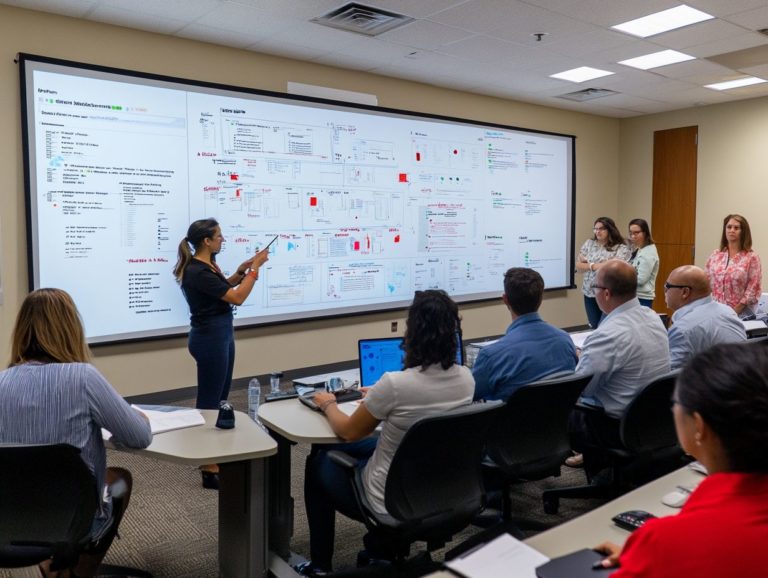Getting Certified: A Project Manager’s Journey
Project management certification is not merely a credential; it represents a transformative journey that can elevate your career to new heights.
Whether your goal is to advance in your current position or to explore new opportunities, gaining certification can unlock pathways to increased earning potential and broader job prospects.
This article delves into the myriad benefits of certification, outlines the steps in the certification process, guides you in selecting the right program, and provides effective strategies for exam preparation.
By the end, you’ll be thoroughly prepared to embark on your certification journey with unwavering confidence.
Contents
- Key Takeaways:
- Benefits of Getting Certified
- The Certification Process
- Choosing the Right Certification Program
- Preparing for the Certification Exam
- Taking the Exam and Obtaining Certification
- Frequently Asked Questions
- What is the importance of getting certified as a project manager?
- What are the common certification options available for project managers?
- How can I prepare for a certification exam?
- Do I need to meet any prerequisites before I can get certified?
- How long does it take to get certified as a project manager?
- Is it worth the investment to get certified as a project manager?
Key Takeaways:

- Enhance your career and earning potential by getting certified as a project manager.
- Understand the requirements and steps to become a certified project manager before choosing the right certification program.
- Prepare strategically for the certification exam with study materials and effective exam strategies to increase your chances of success.
What is Project Management Certification?
Project Management Certification is a prestigious credential that reflects your proficiency in the principles, techniques, and best practices of project management. Awarded by esteemed organizations like the Project Management Institute (PMI), this certification is recognized for its rigorous standards and comprehensive frameworks that define the field.
Earning your Project Management Professional (PMP) certification not only validates your expertise but also enhances your credibility in the workplace and among your peers, paving the way for career advancement and professional growth.
This certification offers exciting options, including the Project Management Professional (PMP) and Certified Associate in Project Management (CAPM), tailored to suit various levels of experience and expertise. The PMI plays a vital role in providing these certifications, along with essential study materials such as a guide that outlines project management practices and the Agile Practice Guide.
These resources are invaluable tools that equip you with the critical knowledge and frameworks necessary for successful project management practices.
As you prepare for the certification exams, you will gain insights into ways to manage projects effectively, including how to choose the right project management certification, that not only boost your confidence but also enable you to lead projects successfully in real-world scenarios.
Benefits of Getting Certified
Securing a project management certification, such as the PMP, can open the door to a plethora of advantages, notably enhanced career advancement opportunities and a boost in earning potential.
As you equip yourself with a recognized certification, you position yourself as a more competitive candidate in the job market, where organizations increasingly prioritize structured project management techniques and frameworks.
Getting this certification shows that you are committed to your professional growth, distinguishing you in a dynamic field that is ever-evolving.
Career Advancement and Increased Earning Potential
Achieving a project management certification can profoundly elevate your career trajectory and earning potential. Certified professionals often command higher salaries than their non-certified counterparts, making this an investment worth considering.
By effectively implementing project management techniques, you can showcase your ability to deliver successful project outcomes a quality highly prized by employers.
As the demand for skilled Project Managers continues to grow, navigating your certification journey, including the steps to becoming a certified Agile Project Manager, positions you as a prime candidate for lucrative roles across various industries. According to the Project Management Institute (PMI), professionals with certifications like PMP or CAPM tend to earn, on average, 20% more than those lacking these credentials.
Roles such as Project Manager and PMO Director frequently see significant salary increases, with seasoned certified practitioners pulling in upwards of $120,000 per year in many sectors. Agile Coaches who hold certifications like Certified ScrumMaster (CSM) also enjoy comparable financial rewards, underscoring the premium that employers place on formal recognition of skills and knowledge in today s dynamic market.
Now is the best time to get certified and boost your career!
The Certification Process

The certification process for project management, particularly when pursuing the PMP credential, is a structured journey. To understand this journey better, you can explore the insightful journey of a certified PM. You must meet specific requirements, engage with various study materials, and ultimately pass the PMP exam.
Candidates must showcase a certain level of project management experience and education, validated through comprehensive documentation. A deep understanding of project management frameworks, especially those detailed in resources like the PMBOK (Project Management Body of Knowledge) Guide, is crucial for success in the examination.
Requirements and Steps to Becoming Certified
To achieve PMP certification, you must meet specific requirements, including educational qualifications and project management experience. You also need to successfully pass the PMP exam.
Your certification journey begins with understanding the eligibility criteria outlined by the Project Management Institute (PMI). This includes a minimum number of hours dedicated to leading and directing projects, alongside ongoing education in project management principles. For more insights, check out the role of certification in project management career. Engaging with the right study materials ensures a solid understanding of the exam content.
You have many options for certification, ranging from four-year degrees to high school diplomas, as long as you possess the necessary project management experience. This flexibility allows individuals from diverse fields to pursue PMP certification, each bringing unique perspectives.
Real-world project experience is essential; it deepens your understanding and prepares you for practical challenges in your career. To enhance your exam preparation, consider using resources like online courses from platforms such as Udemy and LinkedIn Learning. These provide structured learning paths and practical exercises to reinforce key concepts effectively.
Choosing the Right Certification Program
Selecting the right certification program is crucial for aspiring project management professionals. It ensures your career goals align seamlessly with your interests in various project management frameworks and methodologies, such as understanding the role of a certified project manager.
You have many options for certification, including the PMP certification from PMI, the PMI-ACP for Agile methodologies, and specialized programs like the PfMP for portfolio management.
By considering factors such as your personal career aspirations and industry demands, you can make a well-informed decision that sets you on the path to success.
Factors to Consider and Popular Programs
When selecting a project management certification, consider several factors. Think about how well the program aligns with your career goals, the reputation of the certifying body, and the relevance of the study materials. Resources like the Agile Practice Guide and offerings from institutions such as Project Management Academy can be invaluable.
Understanding the differences between popular programs, like the PMP and PMI-ACP, will help you make an informed choice that suits your aspirations.
Accreditation is key; certifications backed by recognized organizations tend to carry more weight in the job market. Evaluate how each program aligns with industry trends to ensure your chosen certification remains relevant.
The PMP (Project Management Professional) is highly regarded for its thorough approach to traditional project management, while the PMI-ACP (Agile Certified Practitioner) focuses on Agile methodologies, addressing the growing demand for modern project strategies.
By weighing these factors, you can better assess the potential return on investment, paving the way for enhanced career opportunities and professional growth.
Preparing for the Certification Exam

Effective preparation for the certification exam is essential for your success. It requires thoughtful selection of study materials, well-structured study plans, and effective exam strategies.
Leverage a variety of resources, including practice exams and mock tests, to gauge your understanding of the PMP exam content and enhance your knowledge of project management frameworks.
Establishing a consistent study routine and diligently tracking your learning progress can significantly elevate your preparation efforts.
Study Materials and Exam Strategies
Choosing the right study materials and developing effective exam strategies are crucial when preparing for the PMP exam. These resources will help you understand and retain essential project management concepts.
Resources like the PMBOK Guide, the Agile Practice Guide, and practice exams serve as a bridge between theoretical knowledge and practical application. Tracking your learning progress with various assessment tools provides valuable insights into areas needing improvement.
Beyond foundational texts, engaging in online forums, webinars, and peer study groups significantly enhances comprehension and provides essential support throughout your preparation.
For exam strategies, allocate specific time blocks for your study sessions. This method helps prevent burnout while ensuring you cover all necessary material. Practicing situational and scenario-based questions is beneficial since the PMP exam emphasizes applying concepts in real-world contexts.
Tackle each question methodically: read it thoroughly, identify key terms, and eliminate clearly incorrect answers to enhance your chances of success. A well-structured revision schedule also aids in consolidating knowledge right before exam day.
Taking the Exam and Obtaining Certification
The final step in your certification journey is taking the PMP exam. For valuable tips and insights from certified project managers, careful planning and preparation are essential to navigate exam day confidently.
Being familiar with the exam’s structure, the types of questions you’ll encounter, and time constraints optimizes your performance.
Once you conquer the exam, it’s important to understand the next steps, including how to maintain your certification through continuous professional development. For detailed guidance, refer to understanding the PMP certification process. This commitment is key to your ongoing success in project management.
Exam Day Tips and Next Steps After Certification
On exam day, implement effective strategies to manage your time and anxiety while ensuring you’re fully prepared. Key tips include:
- Familiarize yourself with the exam format.
- Take deep breaths to reduce stress.
- Ensure all necessary materials are ready before heading to the test center.
After earning your certification, engaging in continuous professional development is essential to stay relevant in the field and pursue further career advancement.
Set specific time limits for each section of the exam to enhance focus and reduce panic. Reviewing key concepts and practicing questions the night before reinforces knowledge and boosts confidence.
Completing the exam is not the end. Embrace ongoing learning through workshops, seminars, or online courses to sharpen your skills and expand your professional network. Staying updated with industry trends ensures you bring innovative solutions to your projects, elevating your career and enhancing your value in a competitive job market.
Frequently Asked Questions

What is the importance of getting certified as a project manager?
Getting certified as a project manager is important because it demonstrates your knowledge, skills, and experience in managing projects effectively. For more insights, consider exploring understanding project management certifications, which can also increase your credibility and marketability while opening up new career opportunities.
What are the common certification options available for project managers?
Several certification options exist for project managers, including Project Management Professional (PMP), Certified Associate in Project Management (CAPM), and project management certification for beginners. Each certification has unique requirements and focuses on different aspects of project management.
How can I prepare for a certification exam?
To prepare for a certification exam, consider taking a training course, joining a study group, or using study materials like books and practice exams. It’s important to familiarize yourself with the exam structure and content, and to create a study plan that effectively covers all the topics.
Do I need to meet any prerequisites before I can get certified?
Requirements for certifications vary. Most require project management experience and education in the field.
Some certifications also require you to pass an exam before applying.
How long does it take to get certified as a project manager?
The time to get certified as a project manager depends on your chosen certification and your study commitment.
On average, it takes from a few months to a year to complete the certification process.
Is it worth the investment to get certified as a project manager?
Yes! Getting certified is a valuable investment.
It boosts your earning potential and validates your skills, helping you stand out in a competitive job market.
This certification can open new career doors for you.






